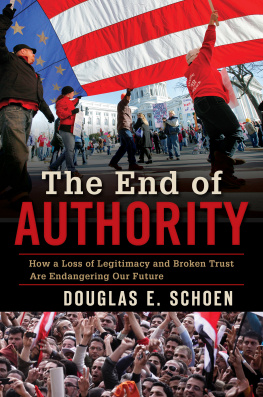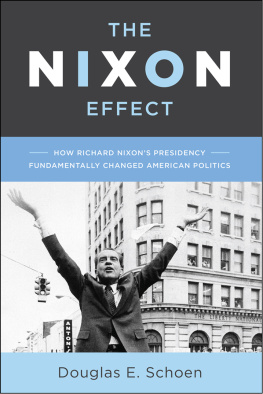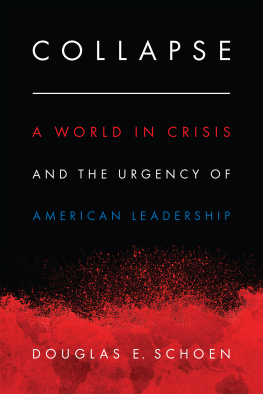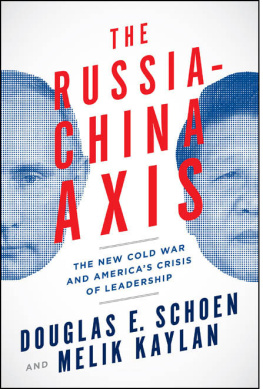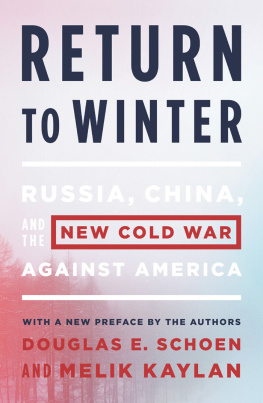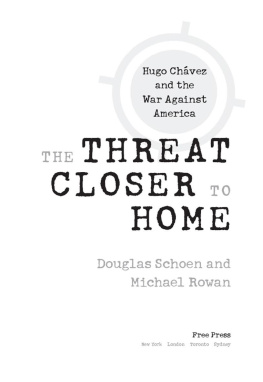Douglas E. Schoen - The end of Democracy? Russia and China on the Rise, America in Retreat
Here you can read online Douglas E. Schoen - The end of Democracy? Russia and China on the Rise, America in Retreat full text of the book (entire story) in english for free. Download pdf and epub, get meaning, cover and reviews about this ebook. year: 2020, publisher: Regan Arts., genre: Politics. Description of the work, (preface) as well as reviews are available. Best literature library LitArk.com created for fans of good reading and offers a wide selection of genres:
Romance novel
Science fiction
Adventure
Detective
Science
History
Home and family
Prose
Art
Politics
Computer
Non-fiction
Religion
Business
Children
Humor
Choose a favorite category and find really read worthwhile books. Enjoy immersion in the world of imagination, feel the emotions of the characters or learn something new for yourself, make an fascinating discovery.

- Book:The end of Democracy? Russia and China on the Rise, America in Retreat
- Author:
- Publisher:Regan Arts.
- Genre:
- Year:2020
- Rating:4 / 5
- Favourites:Add to favourites
- Your mark:
- 80
- 1
- 2
- 3
- 4
- 5
The end of Democracy? Russia and China on the Rise, America in Retreat: summary, description and annotation
We offer to read an annotation, description, summary or preface (depends on what the author of the book "The end of Democracy? Russia and China on the Rise, America in Retreat" wrote himself). If you haven't found the necessary information about the book — write in the comments, we will try to find it.
The end of Democracy? Russia and China on the Rise, America in Retreat — read online for free the complete book (whole text) full work
Below is the text of the book, divided by pages. System saving the place of the last page read, allows you to conveniently read the book "The end of Democracy? Russia and China on the Rise, America in Retreat" online for free, without having to search again every time where you left off. Put a bookmark, and you can go to the page where you finished reading at any time.
Font size:
Interval:
Bookmark:
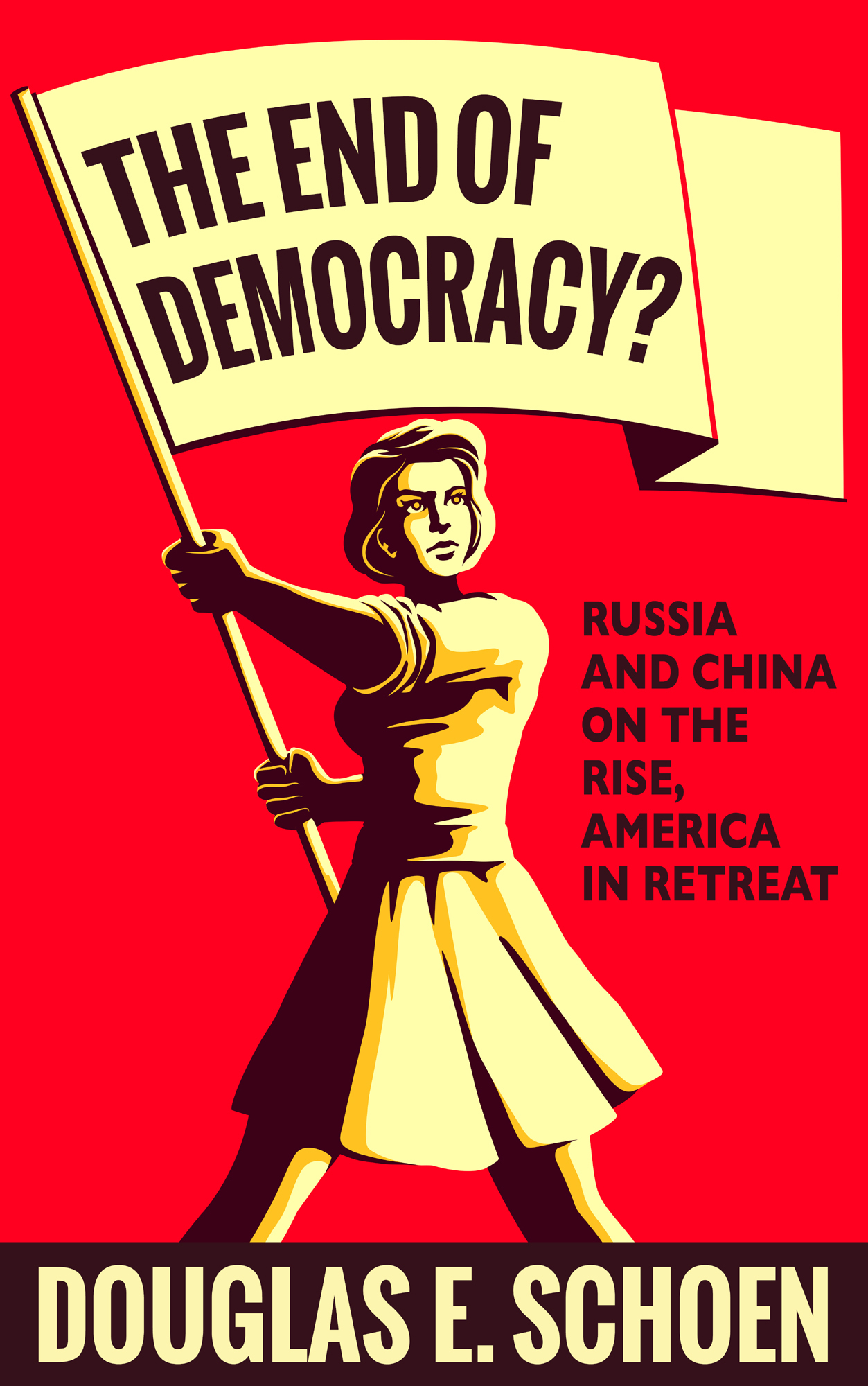


Copyright Douglas E. Schoen, 2020
All rights reserved, including the right to reproduce this book or portions thereof in any form whatsoever. For information, email .
First Regan Arts paperback edition, 2020.
ISBN 978-1-68245-150-2
ISBN 978-1-68245-151-9 (eBook)
Library of Congress Control Number: 2020943859
Cover design by Ariana Losch and M. Marotta Zarba
Cover: vintage Soviet socialist propaganda illustration by drante/iStock
Interior design by Olivier Darbonville
Also by Douglas E. Schoen
Putin on the March
Putins Master Plan
The Nixon Effect
Return to Winter
The Russia-China Axis
America in the Age of Trump
Hopelessly Divided
The Threat Closer to Home
Declaring Independence
The Power of the Vote
The Political Fix
Collapse
Mad as Hell
The End of Authority
American Casino
What Makes You Tick? How Successful
People Do It and What You can Learn from Them
E MPTY STREETS IN THE WORLDS great cities. Boarded-up storefronts. Closed signs in restaurant windows. Rider-less subway trains. Masked people, where people can be seen.
Grim scenes from Italian hospitals: hallways crowded with sick patients on gurneys, not all of whom will receive treatment. Nurses and doctors, exhausted, some in tears and supporting one another, outnumbered by those who need their care. They must make decisions about which patients can be saved and which can be merely made comfortable. Around the world, other countries dread the Italian scenario, in which stress on hospital capacity leads to wartime-like triage operations andthough no one dares quite say itbodies in the streets.
Fortunately, this scenario does not play out elsewhere, though in New York, hospitals spend anxious weeks with crushes of sick patients, and worries mount that the city will not have the resources needed to treat them all. Eventually, New York succeeds in flattening the curve, as the saying goes. Hospitals do not turn away the sick; people do not die in Manhattan streets. But the Manhattan streets are empty of walkers, devoid of commerce, and paralyzed by fear.
The global economy sputters to a near-total halt. The American economy, still the worlds great engine of commerce, essentially shuts itself down. Hundreds of millions of people around the world shelter in place, staying home instead of going out to eat or shop or entertain themselves. Workplaces close. Those whose jobs can be done remotely work from home, to avoid coming into contact with others. Those whose jobs demand on-site presencemillions of peoplelose their jobs, as the business that employ them quickly fold up, unable to sustain a total loss of revenue that stretches from days to weeks to months.
And all along, the lingering questions: how much worse will it get? How many more will die? And how quickly can a treatment be found?
This was the world in March and April 2020: something like a surrealist nightmare, with scenes such as these that would previously have been regarded as the material for dystopian science-fiction novels or disaster films, like Contagion. The novel coronavirus, official name Covid-19, was ravaging people and nations everywhere in the most consequential global pandemic since the 1918 influenza. By early August 2020, the new respiratory illness, originating in China, had spread around the world, causing 18.5 million infections and more than 700,000 deaths. In the United States, the numbers were 4.7 million cases and more than 150,000 deaths. The numbers continue to rise.
Economically, too, the numbers are staggering, especially in the United States, where nearly 50 million people have filed for unemployment benefits. Already, the federal government in Washington has unleashed $1.8 trillion in relief, in the form of the CARES Acta figure more than double the American Recovery and Reinvestment Act of 2009 (commonly referred to as the stimulus), passed in the wake of the financial crisis and the Great Recessionand more than half of total 2019 federal revenues. Only time will tell how many businesses have gone under for good, how many millions have joined the permanent ranks of the jobless, and how much in total national wealth has been wiped out by the cessation of activity imposed by lockdowns, shutdowns, and slowdowns all around the United States.
Europe has been hit hard, too. The injunction to not become another Italy speaks for itself. Though their total deaths are fewer, Great Britain, France, and most other nations have virus mortality rates considerably worse than that of the U.S. With the grim logic it imposes of isolation and limited contact, the virus might well demolish what remains of the European dream of unity and integrationa dream already threatened by the departure of Britain from the E.U. and years of economic turbulence, amid rising populist and nationalist movements.
Nonetheless, the impact of the coronavirus on the United States has been more transformative than anywhere else. The United States has not faced a public-health challenge like the coronavirus since 1918. America is the diseases epicenter: New York and New Jersey have recorded the largest number of deaths. The United States accounts for about a quarter of global infections and more than one-fifth of global deaths. Economically, the U.S. has suffered damage that can scarcely be quantifieddamage that has crossed the threshold of historical comparisons to the Great Depression, entering an uncharted realm. Even when normal life resumes, whenever that may be, the damage is likely to extend for years. Workplaces, restaurants, public transit, live events such as sports or music, schooling, travel, medical careall of these areas, and more, will be transformed by the pandemic.
We will not go back to how things were. We will live in a post-Covid-19 era.
So all-encompassing has this experience been for so many Americans, and for citizens around the world, and so challenging, in terms of making the necessary adaptations to living differently, that it is easy to overlook the historical and political nature of what has occurredand continues to occur. The historical nature is simple: our world will change, cities will change, economies will change, as a result of the virus, as they have in the past in response to other great plagues of contagious disease, from cholera to bubonic plague to influenza.
The global political ramifications, however, are more often overlooked. Most Americans, understandably, will focus their political judgments domesticallyon the looming 2020 presidential campaign, and on whether, in their judgment, Donald Trump deserves another term in office; or whether Joe Biden and the Democrats, tireless critics of the administrations Covid-19 preparedness and ongoing response, should take the reins of national leadership. All of that will be adjudicated at the polls in November.
But there is a much bigger matter to be assessed, strange though it may sound to say so, in a presidential election year. And that is the matter of China. It was China, after all, that foisted the coronavirus upon the world, first through its negligence and then through its coverup and suppression of information about Covid-19. The coronavirus added a whole new context to an ongoing trade war between China and the United States and to the two nations struggle for supremacy in the South China Sea and, more generally, for global leadershipa struggle made ever-more daunting for the U.S. by rising Chinese adventurism, not only in the South China Sea but also in Hong Kong and North Korea. And this broader context makes the story of Covid-19 even more troublingfor the viruss impact on the world would almost certainly have been less severe had the Communist government in Beijing not behaved as it did.
Font size:
Interval:
Bookmark:
Similar books «The end of Democracy? Russia and China on the Rise, America in Retreat»
Look at similar books to The end of Democracy? Russia and China on the Rise, America in Retreat. We have selected literature similar in name and meaning in the hope of providing readers with more options to find new, interesting, not yet read works.
Discussion, reviews of the book The end of Democracy? Russia and China on the Rise, America in Retreat and just readers' own opinions. Leave your comments, write what you think about the work, its meaning or the main characters. Specify what exactly you liked and what you didn't like, and why you think so.

